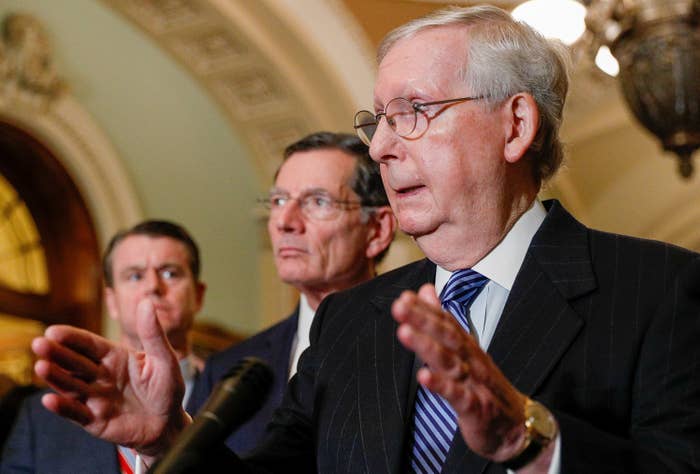
The Senate will begin an impeachment trial of President Donald Trump soon, but so far no one knows what that will look like or whether high-profile figures will be called to testify.
Senate leaders have not yet begun to negotiate a set of rules to shape the trial that will be triggered once the House votes to impeach Trump next week, as is expected. While House Democrats created a tightly controlled process, there’s no plan in the Senate, and Republicans there are split on if they should call in witnesses at all.
The question that no one can answer is whether the Senate trial will keep a narrow focus, or if Trump’s legal team will be able to grill political rivals in front of the TV cameras. Trump and some Senate Republicans are calling for a sweeping witness list that includes Joe Biden, his son Hunter, and the whistleblower who first alleged that the president demanded a political quid pro quo from Ukraine.
“I am going to vote to give virtually unfettered discretion both to the prosecution and to the defense to call whatever witnesses they want, to cross-examine each other’s witnesses, and to offer whatever rebuttal emanates,” said Louisiana Sen. John Kennedy.
Democrats have their own witness wish list, which includes Vice President Mike Pence, Trump’s acting chief of staff Mick Mulvaney, Secretary of State Mike Pompeo, and former energy secretary Rick Perry. This is why other Republicans, such as Senate Judiciary Committee Chair Lindsey Graham, want to avoid the blank check approach.
“They’ll try to call Pompeo and the vice president. I can see this thing turning into a circus, and I really have no interest in that,” said Graham.
Usually these questions would be settled by Senate Majority Leader Mitch McConnell. But impeachment is one of the rare cases where McConnell does not control the Senate floor. It takes a majority of senators to pass a resolution that dictates who will testify. Even during the Clinton impeachment, when a set of rules was agreed to unanimously, the Senate could not agree on the issue of witnesses.
At some point McConnell and Minority Leader Chuck Schumer will meet and try to hash out a bipartisan plan moving forward. But many see this as unlikely. Senate Whip John Thune said he has trouble seeing 51 Republicans agreeing to an agreement, let alone Republicans and Democrats. “It’s very fluid; it’s hard to handicap it,” he said.
Anything is on the table. There could be a broad bipartisan deal, or Republicans could cobble together 51 votes to set their own rules, or factions of Republicans and Democrats could team up to set the terms.
If no agreement is reached, then John Roberts, the Supreme Court chief justice who will act as judge during the trial, will call the shots.
In the House, Democrats focused on the witnesses who testified that Trump withheld hundreds of millions of dollars in congressionally approved military aid from Ukraine until the country's president announced an investigation into the Biden family. Senior Trump officials refused to testify before the House.
Republicans chafed at not being able to investigate the Bidens. When Joe Biden was vice president and Barack Obama’s point person on cleaning up Ukrainian corruption, his son Hunter took a lucrative board seat on a company founded by a former Ukrainian politician who was widely seen as corrupt. Republicans also wanted to question the unnamed individual who first filed a whistleblower complaint against Trump over Ukrainian aid.
Now that the process moves to the Republican-controlled Senate, Trump’s allies are seeing their chance to take control. Sen. Ted Cruz called Hunter Biden and the whistleblower “fact witnesses that are on their face relevant to the issues” and said it would only be fair to allow Trump’s legal team to call them.
But there may not be enough of them. Some Republicans are still aspiring toward a bipartisan deal that will lend the process credibility — especially since a party line vote acquitting the president is widely expected.
“It would help the optics in the Senate if we could at least agree on the rules,” said Sen. Roger Wicker. “The outline being a foregone conclusion.”
